Get French Football News
·30 September 2020
FEATURE | The Story of Patrick Tardieu
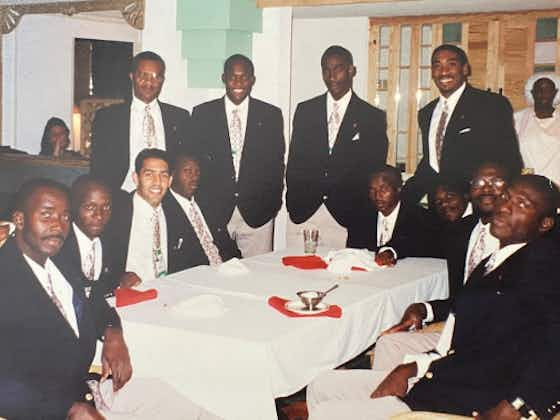
Get French Football News
·30 September 2020

Patrick’s story was written long before he was born. Patrick’s father, a successful entrepreneur, left Haiti to be educated in Europe. He returned home to Haiti with not only a European education, but with a new love: European football. Patrick’s father went on to establish businesses in his home country, but when he had his children, he had one thing on his mind—instilling his love of football in them.
Patrick was born and raised in Port au Prince, Haiti. In Haiti, the game of football is followed with the same adherence as religion. Kids play in the streets and in the fields with anything round enough to kick into a goal. Patrick was not only groomed from a young age for Haitian football, but looking back, he was destined; growing up alongside what would become Haitian football folklore.
Patrick’s journey begins in the golden era of Haitian football. To put things into context, in the 1970’s, Haiti was a giant amongst the teams in CONCACAF. The country was in the midst of football hysteria when Haiti, in 1973, became Gold Cup champions. A year later, Haiti went on to score an iconic goal in the World Cup against Italy. That famous goal broke Dino Zoff’s clean sheet streak of 1,142 minutes. The goal was started by a through ball from Philippe Vorbe to the great Manno Sanon, intertwining the two in not only Haitian, but global, football history.
It is that same legend, Philippe Vorbe who trained Patrick; forever connecting Patrick to a lineage of legendary footballers before him.
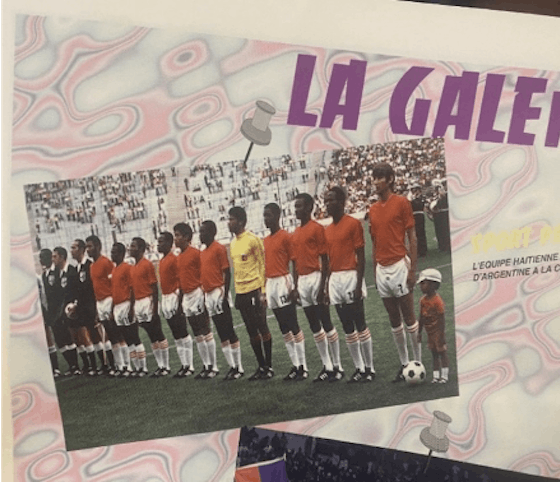
Ligue Haïtienne
At the age of 4, Patrick’s father took his children to the local youth club, Les Colibris which was owned by Philippe Vorbe who also happened to be a friend of the family. From then on, Patrick began to learn the game from his hero at Les Colibris’ academy.
By the time Patrick reached his teenage years, it was clear he had something special. So special that he was selected to study and play football at the prestigious academy of Saint-Louis de Gonzague. While at Club Sportif Saint-Louis (CSSL) it was evident that Patrick was a player with great potential. He displayed a pace and attacking ability that other kids his age were not equipped with. So much so that the Haiti U16s had already called him up to start for them.
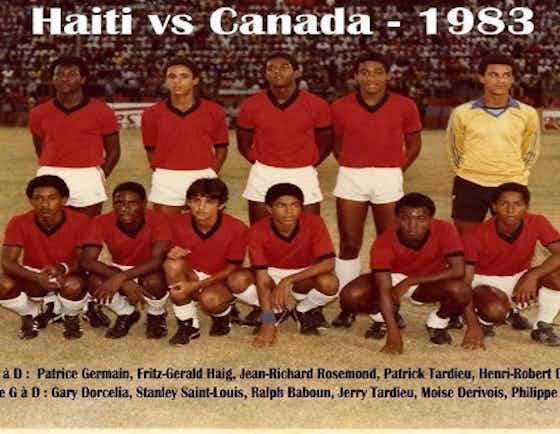
Patrick’s skyrocketing success may have come too quickly. At the age of 15, Patrick was chosen for a tryout with FC Nantes in France. Looking at this opportunity through 2020 eyes may undervalue the significance of that reality. Patrick walked through the doors of FC Nantes to a dressing room with Didier Deschamps, Marcel Desailly, and Patrice Loko.
Admittedly, 15-year-old Patrick did not understand the opportunity he had during his stay with FC Nantes. Patrick returned to Haiti after his time in France to discuss with his parents the open offer of signing with FC Nantes.
Though a fan of the sport, like many Haitians, Patrick’s parents raised their children with school being the first priority. Playing football in France’s Ligue 1 would not allow Patrick to commit the level of dedication to his education as was expected from a “Tardieu.” Furthermore, young Patrick, who was already accustomed to the warmth of the Caribbean sun on his face, did not see the return to the chilly coast of northern western France as the catapult that it really was. Especially when he was already playing professionally in Haiti and being selected regularly for his national team.
Patrick turned down FC Nantes in exchange for comfort, but this mistake would be a lesson that would help him in the future. This experience also built his confidence as a player. Patrick was amongst the world’s elite youth players at Nantes. Recalling:
“I did not have the [financial] need which kind of limited the opportunity to be catapulted to being one of the best players in the world which would have been the case if I had stayed in Nantes. Just like my teammates who succeeded. I was among the 5 best players at FC Nantes in my category. Marcel Desailly was there, Deschamps was there, Patrice Loko was there, but I was a much better forward than Patrice Loko and Patrice Loko played for the national team of France!”
Knowing that he played with these stars, Patrick continued his dreams of football and education in Haiti.
The Moment
Every person comes to a crossroads, a defining moment in their life. While finishing the season at Sportif Saint-Louis in Haiti, 16-year-old starter Patrick’s moment came against one of Haiti’s largest clubs: Aigle Noir. Aigle Noir had Haiti’s best player in their ranks as well as Haitian national team captain at the time—centre back Donnet Desilus.
Young Patrick lined up for the match in the bright lights in front of a hostile crowd of Aigle Noir fans.
What many did not know at the time was this match was a battle of old and new, the past and the future, and the current captain versus the captain to come. Patrick himself had goosebumps when telling the story of their first head-to-head battle:
“Donnet Desilus looks at me. The game starts, I have the ball in the attacking third. Donnet bumps me and says, ‘Ti Tardieu, sa se football granmoun!’ (Little Tardieu, this is grown man football!) ‘Mwen la, pa ginyin timoun ki ap jwe la.’ (I’m here, there are no children playing here.) ‘M’ap manjew aswe a!’ (I will feast tonight!) 40 years later, I have goosebumps! Donnet Desilus knew my name! Donnet Desilus knew I was dangerous and needed to get in my brain and by doing so, while he thought he was intimidating me he didn’t understand that he was giving me wings. That game I killed it.”
It was at that moment Patrick decided that he would give football the effort it deserved. He would not take his parents route of school first like his older brother Jerry, who earned a Master’s degree from Harvard University. Instead, he would honour his family and himself by playing the beautiful game and educating himself. Patrick could even recall the exact moment this revelation took place. He thought to himself:
“That day, I knew. I knew that if Donnet Desilus knew my name, if that hero knew my name, then the world should know my name.”
Soon after, Patrick signed with Violette AC in Haiti at the age of 16. Playing for Violette was a dream come true for Patrick. Not only did he grow up a fan of the club, but his mentor Philippe Vorbe played for Violette and his father was a past vice president of the club. As a child, Patrick was such a fan of Violette that he would cry when they lost a game. Patrick used those same memories to avenge those childhood scars of watching his boyhood club lose by defeating those same clubs that had made him cry in the stands. The rivalry matches against Aigle Noir and Racing Club Haïtien were that of Champions’ League matches to Patrick.
Yet, life was not always fair. Just as Patrick was starting his ascension, he was forced to leave Haiti as political unrest erupted with national turmoil under Jean-Claude Duvalier. Thankfully, Patrick’s uncle was a diplomat in Belgium.
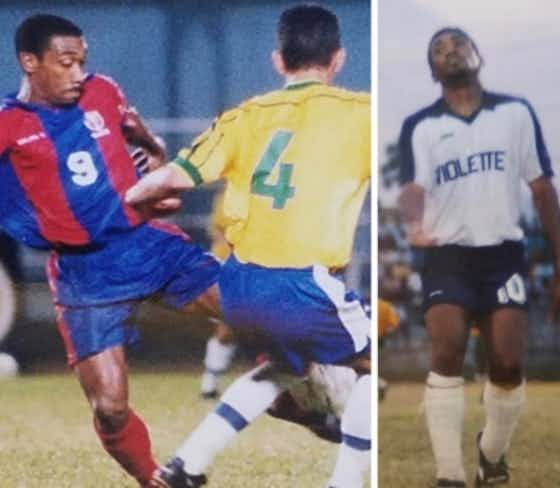
Life Had Other Plans
Leaving Haiti as a teenager was one of the most difficult points in Patrick’s life. If he decided not to go to Nantes, surely he did not want to leave Haiti to go live with his uncle in Belgium. However, Patrick did not let the uncontrollable circumstances of his life dictate his future. In Belgium, his uncle once again pushed him towards education. Even while following the direction of his uncle and attending college, Patrick was able to find a way back to his first love and secure his next professional contract in one of Belgium’s lower divisions. Meanwhile, Patrick continued his climb up the ladder with the Haitian national team and became a national hero.
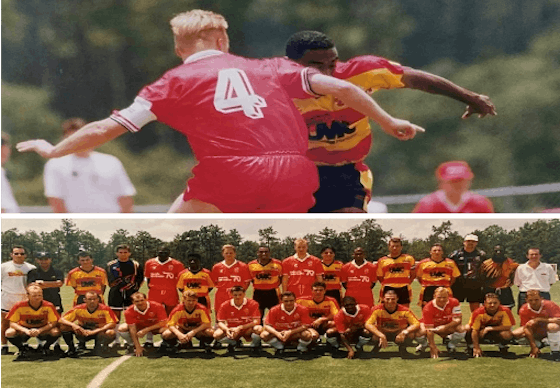
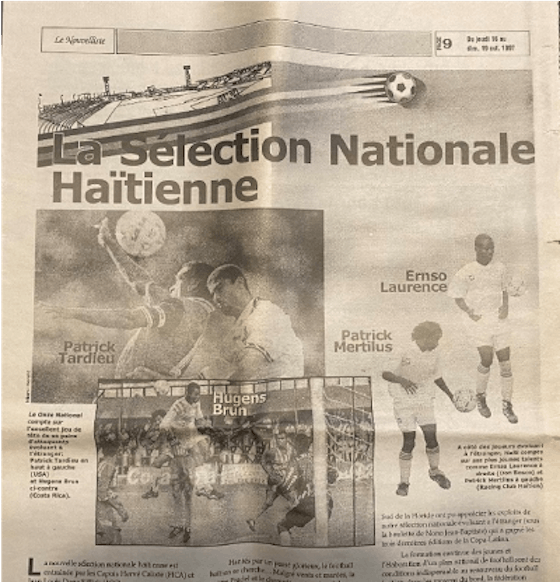
Patrick would reunite with his family on summer vacations in Miami. He soon fell in love with America. Patrick quickly came to the decision many other footballers make today and decided that he would try his luck as a pioneer of America’s new sport of soccer in the American Professional Soccer League (APSL; now the MLS). His chance would come quickly. The Fort Lauderdale Strikers’ head coach Thomas Rongen jumped at the opportunity to sign Patrick after seeing his talents on display in a friendly match with Haiti and the Fort Lauderdale Strikers.
Patrick knew that the sport of football would catch on in the United States, but it was not overnight. Early on, fans of the APSL were people who had ties to South America and Europe and longed for the live experience. Patrick slowly saw the roots of soccer grow into the communities of the United States and Canada with the Montreal Impact. It is that sort of vision that made Patrick the man he is today, but even he could not foresee the success the MLS would have. Watching Inter Miami play in 2020 on the same field that Patrick called home for many years fills him with a feeling of nostalgia. He takes pride in the fact that he helped paved the way for so many other Haitian international footballers to take that leap of faith in America.
Patrick’s entrepreneurial spirit would not let him sit still. Patrick was accustomed to two practice sessions a day. Now, in America, he only had one practice in the mornings and games on the weekend. Patrick was able to leverage his brand as a professional soccer player and captain of the Haitian National team to start his first business. He created a shipping company with his brother Jerry that would turn into the largest freight forwarding company in Haiti, TARIMEX.
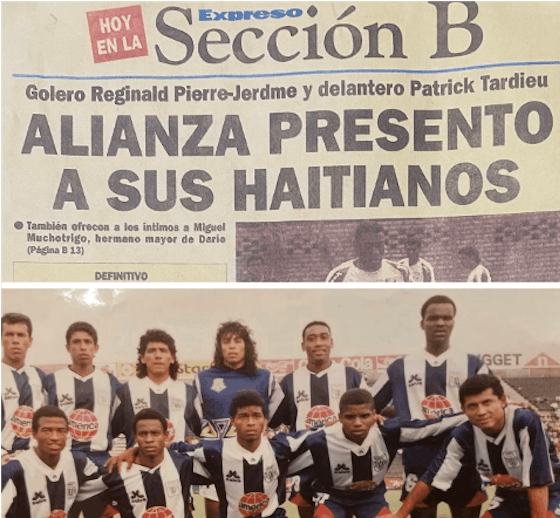
With the business running successfully, Patrick desired a new challenge. Peruvian legend Teófilo Cubillas soon noticed Patrick’s out-of-place talent in the APSL and decided to take Patrick under his wing. Taking advantage of the short seasons of the APSL, Cubillas flew Patrick to Peru to play for his former club Alianza Lima.
Patrick arrived with Cubillas in Peru on a mission. Cubillas negotiated with Alianza Lima while Patrick lit up the pre-season, making front page headlines on several occasions.
As a Haitian player, Patrick was raised on South American football, so he was in his element in Peru. However, Patrick’s time in Peru would be short-lived. After the pre-season, Cubillas was unhappy with the proposed deal for Patrick and decided that it was time to prepare Patrick for the approaching inaugural MLS season.
MLS
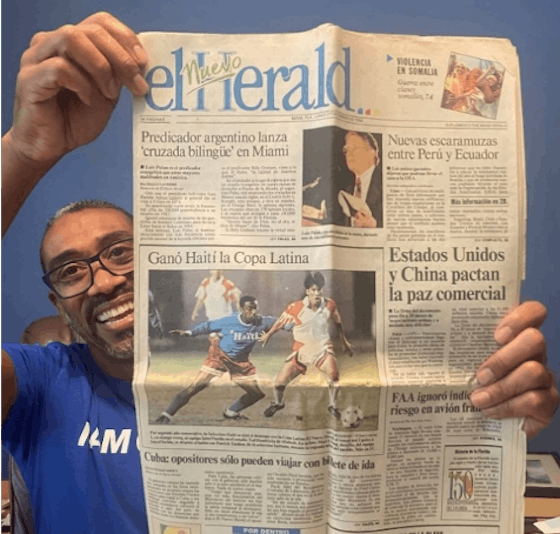
With the MLS approaching, Patrick needed a way to stay in soccer shape and showcase his talent. That showcase was the Copa Latina. The Copa Latina was one of the most prestigious amateur championships in the country. This cup drew international attention and the players who attended consisted of the best players in Latin America: players from Boca Juniors, River Plate, and national teams across South America. Patrick captained his group of Haitian internationals and not only won the cup but was named MVP.
With this display of talent in hand and Patrick’s resumé of serving as captain of the Haitian national team, Cubillas scheduled a tryout with the New England Revolution. Within 1-hour, head coach Frank Stapleton, former star player of Manchester United, signed Patrick to New England as the first Haitian Player in the MLS.
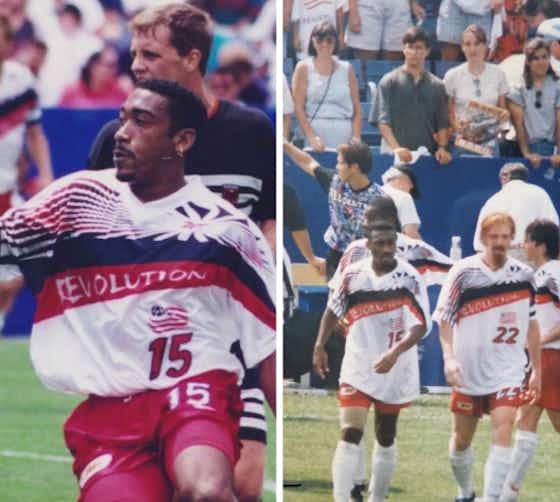
After one season with New England, Stapleton was replaced and with that change the new coaching staff wanted their own pick of players. That led Patrick to his largest opportunity of his adult life—a pre-season with San Lorenzo de Almagro. Again, Patrick was amongst the stars including Paulo Silas (Brazil National team), Sebastián Abreu (Uruguay National Team), Pipo Gorosito (Argentina National team), and Oscar Ruggeri (Argentina National team). Patrick ran into the same issue many players in the United States ran into: San Lorenzo was out of international roster spots. Patrick had an offer to play with one of the other first division teams until a spot opened up, but at the time Patrick was also running a million-dollar business. Instead of going for the unknown, Patrick opted for the return to the United States.
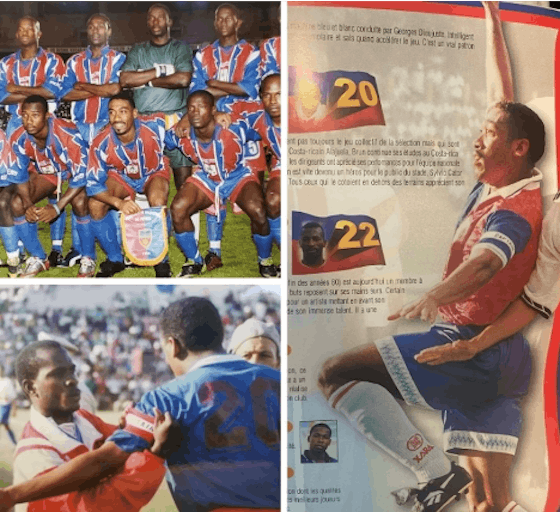
The Business of Soccer
After a nearly 20-year career with Haiti’s National team, Patrick’s most cherished memory was not his game-winning goal against Brazil that knocked them out of the Caribbean Cup, the countless matches as captain, or playing with the world’s best. When asked what his greatest success was in football, he responded that is was his advocacy for his teammates and Haitian football including speaking out against unpaid wages and negotiating Haiti’s hiring of a proper international manager Jorge Castelli from Argentina. Patrick utilised his relationship with Castelli as his former coach at San Lorenzo to convince him to take his first national team coaching job after personally bringing him to Haiti to meet with the Haitian Football Federation.
Patrick would continue to utilise these types of relationships upon his retirement when he started Soccer Management Services (SMS). Patrick knew his countrymen had talent and based on his experience, he also knew that if his countrymen had proper representation, they could go the distance. In typical Tardieu fashion, he went all in and brought his players abroad to find them proper contracts.
In the following months, Patrick would have one of his SMS players with the elite of France at his childhood club FC Nantes. That player was long-time Ligue 1 defender Jean-Jacques Pierre who would go on to appear in 143 matches for Nantes not to mention several other Ligue 1 clubs. Pierre’s signing made history as the highest salary/transfer of any Haitian player up until that point under Patrick’s Soccer Management Services (SMS). Patrick had now found something that filled his passion for business and his beloved game.
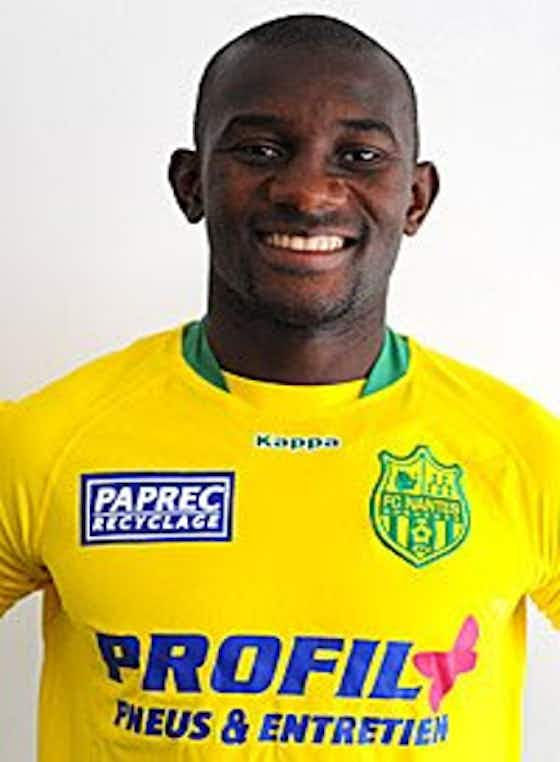
In response to hearing that national team coach Collat was selecting only players who played abroad, in 2008, Patrick requested that the Haitian Football Federation gather the best talent from amongst the Haitian league teams for a showcase. Patrick highlighted this event by flying in a recruiter from Rapid Vienna who was searching for afro-Caribbean players. Five players were chosen by the recruiter, two of which were forbidden from accepting by their respective teams fearing they would be stolen by the European giants.
This further highlighted Patrick’s struggle of elevating his country. Patrick flew those three best players to Austria and France to meet with countless first division clubs and recruiters. Again, Patrick utilised his 20 plus years of relationships with Rapid Vienna, Football Club Austria de Vienne, Lask Linz, SV Reid in Austria and RC Lens, FC Nantes, Guingamp, and Toulouse in France.
Life Today
Patrick is now a father and a family man. The lessons he has learned throughout his career have bettered him as a businessman inside and outside of football, especially as a father. The joy of teaching his son Tristan the game reignited Patrick’s drive. He began teaching his son the same lessons Philippe Vorbe taught him with modern techniques.
Though his professional pedigree did not require him to obtain it, Patrick continued his education by earning his National C Coaching Licence. Patrick realised that the mentoring he was doing as an agent was critical to the mindset of a youth athlete. He realised that what we are currently offering players in the United States is not setting them up for success here let alone in Europe. That is why he decided to start Premier Soccer Training (PST).
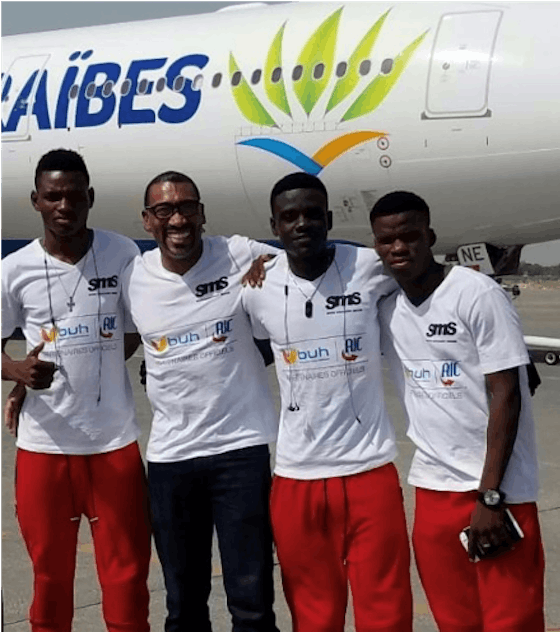
PST bridges the gap between club soccer and personal player development by personalising the approach. PST assesses each player, their mindset, education, and position while providing specific training. PST’s blue-sky method ensures a professional standard that a youth athlete can understand and benefit from while creating a training platform that could take players and put them in positions to have international exposure. This project is decades of experience and business relationships brought together to elevate young players with aspirations of becoming professional or college athletes.
Legacy
Today, Patrick fears the work he has done as an ambassador for Haitian football is in jeopardy and that his legacy is diminished by headlines of the current situation at the Haitian Football Federation with the scandal surrounding its current president. When asked about that situation Patrick said this:
“I will submit to the process of trial and innocent until proven guilty. If found guilty, any suspect should pay for the consequences of his/her actions. Just as if found innocent, that same suspect should be freed from prosecution. That is my take. I just don’t want bad press to paint my country and my sport with a broad brush.”
“I have always tried to be the change I see for Haitian soccer. Everything I have done for the sport in my country, I have done in utmost transparency, with full dedication, commitment, trust, and integrity. My dream is that I finally see the day where my country reaches the World Cup final stages again. That is ultimately what I aspire to. I was not able to have this materialise as a player. I have tried again as an agent representing players who followed in my footsteps after I hung-up my boots.”
“Today I am continuing to work towards that dream, but this time as a youth coach developing players. It’s my hope that I will be able to have the same effect on them that Phllippe Vorbe and my other coaches had on me.”
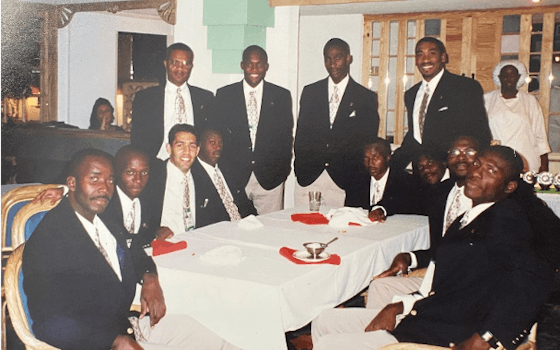
Patrick did not let missteps as a youth athlete or political turmoil in Haiti stop him from manifesting his dream of being a professional athlete. With the success of his projects in the past, I am quite sure we will be adding to his biography in the years to come.






























































